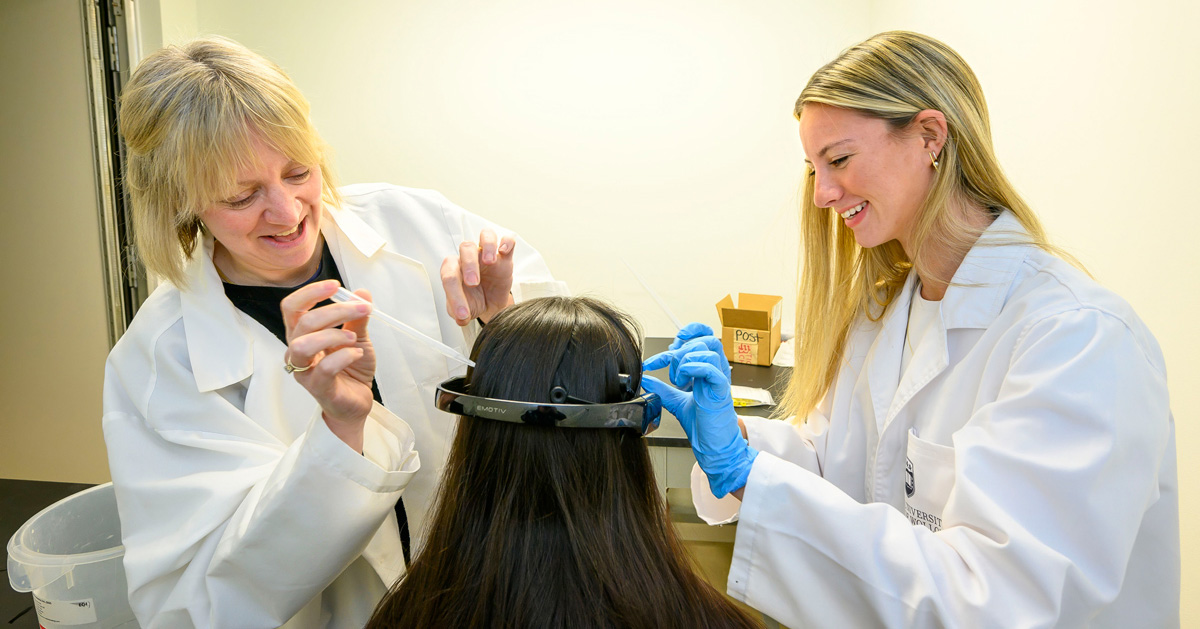Discovering the impact of music

Marguerite Bartlett ’25 receives Psi Chi Undergraduate Research Grant to assess how music influences stress response
Does music soothe the soul or stoke stress? Marguerite Bartlett ’25 is searching for answers. The neuroscience major recently earned a Psi Chi Undergraduate Research Grant and is using the award to discover how listening to music impacts an individual’s stress response.
Collaborating with Katherine Eskine, associate professor of psychology and chair of Wheaton’s Psychology and Neuroscience Department, Bartlett is the second student to receive the award this year. She and Katie Lanni ’25 are among approximately 25 students to garner support each year from the international honor society in psychology
Participants in Bartlett’s project are listening to three different sounds: babble [a recording similar to muffled conversation], Disney instrumental and French death metal. Using a trio of measurements, Bartlett gains a comprehensive understanding of the individual’s stress responses to each condition.
“Through the EEG [electroencephalography], I’m looking at Alpha and Beta brain waves,” she said. “Alpha corresponds to a more relaxed state and Beta correlates to an increased arousal state. Secondly, a saliva cortisol test analyzes your physiological stress response, as cortisol is our main stress hormone.” Lastly, research participants complete a standard stress assessment survey, which measures their perceived level of anxiety.
In addition, Bartlett is measuring how each individual’s psychological state changes. “By assessing them before and after they listen to the music, I’m seeing how their psychological state, or their perception of how they feel, changes.”
Through a variety of outreach methods Bartlett recruited 75 individuals to join the study, and each participant took up to 45 minutes to complete their session.
Eskine explained the nuance of Bartlett’s research, “Marguerite is looking at music-evoked stress reactivity. Few people have studied EEG, music, listening and cortisol and she’s the first person to do it with this kind of setup. The minutiae of the methods makes hers a novel approach.”
A native of Centerbrook, Conn., Bartlett realized the importance of music to her mental health during her junior year. A member of the cross country and track and field teams, a surgical procedure to an injured hip put the avid runner on crutches for eight weeks. “Listening to music helped my mental health when I was unable to run,” she said.
Earlier that year, Bartlett discovered her passion while taking a “Cognitive Neuroscience” course with Professor Eskine. “I fell in love with it, the research, and thinking about everything I could do,” she shared. “I read the whole textbook.”
While enrolled in Eskine’s “Capstone in Cognitive Neuroscience” course as a junior, she confirmed her interest. “We did a group project on how stress impacts reaction time. Using an EEG, we analyzed an audiogenic stressor [playing a pure tone sound at 60 and 80 dB] and it was amazing. And I knew after completing the course that I wanted to write a thesis.”
The thesis became her current research project and led to her Psi Chi grant application, and the award. “It’s amazing to get recognition for the work that I’ve done. I’m proud to be conducting neurological research,” Bartlett said.
Bartlett, who was diagnosed with epilepsy during her first year at Wheaton, said that her condition has influenced her studies. “It [epilepsy] definitely drove me into working with EEG rather than any other technology we have,” she said. “And it guided me into the cognitive side of neuroscience, as well.”
To pursue her desire to continue research this fall, Bartlett has applied to the Tufts University Graduate School of Biomedical Sciences and the master’s program in integrative neuroscience at Georgetown University. “I’m really excited,” she said. “I’d like to focus on how to improve on research technologies or to expand upon either disease research or neurological research.”
Eskine is eager to see what Bartlett accomplishes next. “Marguerite has taken very quickly to understanding complicated measures. Measuring the brain is messy. It requires a lot of skills, including quick problem-solving. Marguerite has those skills and I think she’s going to do great.”
